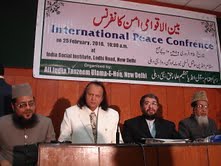By Manzar Imam.
New Delhi: I still wonder what Indian Muslims want. With no direction and power social, political or otherwise, where are they headed for? These questioning views were expressed by noted businessman and president of India Islamic Cultural Centre, Sirajuddin Qureshi here at a peace conference organized by All India Tanzeem Ulama-e-Haq, a Delhi-based socio-religious trust. Held on 25 February at Indian Social Institute, Lodhi Road, the conference coincided with the release of a special issue of quarterly journal Husn-e-Tadbir on the 20th century renowned scholar of Hadith, Allama Anwar Shah Kashmiri.
The world today needs peace, Maulana Ajaz Urfi Qasmi, president of the Tanzeem Ulama-e-Haq said in his inaugural speech. Fear and mistrust have blocked many ways of human development and spread negativity, he added.
Speaking about peace in Islam, Dr Aziz Burney, editor Rashtriya Sahara Urdu daily regretted that Islam was unfortunately linked with terrorism. Taking a dig at major world powers, Burney said that they had vested interests and wanted to root out Islam. There is a conspiracy to tarnish the pristine image of Islam in the entire world, he said adding that every major and minor incidence is seen in the backdrop of terrorism. Islam is the religion of peace and it has nothing to do with terrorism, he reiterated.

L-R Ajaz Urfi Qasmi, Aziz Burney, Dr Karim Najafi, Jalaluddin Umri
Iran’s cultural counsellor Dr Karim Najafi Barzegar said that the message of Islam was not meant for Muslims alone. It is for the entire world, he said. Dr Najafi added the Prophet Muhammad was sent as an apostle of peace and mercy for the whole world.
Calling peace a byword of Islam, Maulana Abdur Rahim Milli of Bangladesh said that Muslims needed to do two things: greet each other with salam and invite people. He further elaborated it that invitation could be to a common stage where views could be exchanged and it could also be an invitation to the dining table as it provided one chance to strengthen relations and thus convey the message.
Former Samajwadi Party leader and Member of Parliament, Amar Singh went on a high note stating that 80 crore Hindus will not rest in peace the day 20 crore Muslims are in pain. In his criticism to secularism Singh said that secularism had dissolved in communalism like water dissolves in milk. Singh said that communal elements had poisoned every political party.
In his presidential address, Maulana Syed Jalaluddin Umri, emir Jamaat-e-Islami Hind took an exception to such extreme views as labeling an individual or nation as anti-peace and said that violence was anathema to human nature therefore caution must be taken while calling an individual or nation enemy of peace. He further explained that irrespective of whether or not one indulged in an act of violence, no one surely likes to be addressed as an enemy of peace for it goes against the human nature and hurts sentiments.
Maulana Asghar Ali Imam Mehdi, general secretary of Jamiat Ahle Hadith stressed the need for unity and said that Islam frees man from every fear. How could a religion that preaches peace be associated with terrorism?
Tanazuraat (Perspectives), a collection of journalistic writings by Abid Anwar was released by on this occasion by Dr Karim Najafi, Jalaluddin Umri and Ahmad Khizr Shah Masudi. Khushbu, Roshni, Rang another book by noted critic Haqqani Al-Qasmi was also released.
Delhi-based journalist Manzar Imam presented a brief note on Abid Anwar and Haqqani Al-Qasmi highlighting their work and experience and their contribution to media and literature.
Born in a small hamlet in the erstwhile Purnea district of Bihar, Haqqani rose to great literary heights. He was educated in the famed Darul Uloom in Deoband and later went to the prestigious Aligarh Muslim University.
Manzar Imam said that Haqqani always talked about truth and raised his voice against literary mafiosi. He commended his bold and fearless writings that challenged the dictatorship of those who belittled some great literary works just because these came from people living in fringes and backwoods.
While talking about Abid Anwar, Manzar Imam said that UNI journalist Abid Anwar had been contributing to Urdu media for over one and half decades and that his writings had found a good number of admirers.
Manzar Imam also commended the work and services of All India Tanzeem Ulama-e-Haq. He said that the Tanzeem was doing a tremendous job by appreciating and recognizing new writers.
It should be noted here that both Tanazuraat and Khushbu, Roshni, Rang have been published by Tanzeem Ulama-e-Haq. The Tanzeem has also been giving awards to people from different walks of life for their notable services. This time again the Tanzeem gave various awards to many people for their work in many areas of life.
A seven-point resolution was also passed and upheld by the audience. The resolution included condemnation of bomb blasts in different parts of India, a demand to get complete minority status to Jamia Millia Islamia and Aligarh Muslim University. It also appealed the government to warn news channels and newspapers that broadcast and publish rumours and cooked up stories that spread hatred.
(A Delhi-based Manzar Imam can be reached at [email protected] or +91-9810035066)

